- Home
- T. Kingfisher
Seventh Bride
Seventh Bride Read online
CONTENTS
Copyright Information
Praise for "Toad Words"
Title Page
Dedication
Chapter One
Chapter Two
Chapter Three
Chapter Four
Chapter Five
Chapter Six
Chapter Seven
Chapter Eight
Chapter Nine
Chapter Ten
Chapter Eleven
Chapter Twelve
Chapter Thirteen
Chapter Fourteen
Chapter Fifteen
Chapter Sixteen
Chapter Seventeen
Chapter Eighteen
Chapter Nineteen
Chapter Twenty
Chapter Twenty-One
Chapter Twenty-Two
Chapter Twenty-Three
Chapter Twenty-Four
Chapter Twenty-Five
Chapter Twenty-Six
Acknowledgments
Other Works
This is a work of fiction. Any resemblance to persons, places, large waterfowl, events, or actual historical personages, living, dead, or trapped in a hellish afterlife is purely coincidental.
Copyright 2014 Ursula Vernon
All Rights Reserved
Published in the United States by Red Wombat Tea Company
Artwork by Ursula Vernon
Praise for “Toad Words”
“…a book of re-told fairy tales, all in the quirky, matter-of-fact-in-the-face-of-total-nonsense style that I’ve always loved. They’re often dark, sometimes sad, but always endearing, even when they’re disturbing.”
—Pixelatedgeek.com
The
Seventh Bride
T. Kingfisher
For Brooke
(stone)
CHAPTER ONE
Her name was Rhea.
Her father said that she had been named after a great and powerful goddess of the old days, the queen of all the gods, but in that country at that time, there weren’t many books about gods. There were too many problems with wizards and fairies and odd things popping up in the corners of the potato field for anyone to want to invite more supernatural intervention. People prayed, when they prayed at all, to the old saints and heroes of the country—Saint Olio and Cullan the Archer and the Lady of Stones, saints who might be expected to understand the special trials of living in that land—and left the gods alone.
As a result, when Rhea tried to look up anything related to “rhea” in the few books available to a miller’s daughter, all she could find were pictures of a probably-mythical creature that looked like a giant, ill-tempered chicken with a very long neck. There was no reason that a goddess had to look human, of course—plenty of them had never been human, which was part of the reason that the saints were safer—but if one was immortal and had to pick a shape, a giant long-necked chicken seemed like an odd choice.
Rhea the girl felt that, had she been Rhea the goddess, she would have done a better job there. There were plenty of lovely and noble birds, like eagles and peacocks and phoenixes, which would have been a vast improvement over the rhea.
Probably not swans, though. Swans came sweeping down the millstream fairly regularly, and they looked beautiful, with their high, proud necks and dark eyes. But if you were sitting on the bank, minding your own business, with a bit of lunch, and the swans caught sight of it, they’d be out of the water and advancing before you knew it. They hissed like serpents, and those beautiful white wings could hit like a sledgehammer.
(And there is nothing quite like turning up at home, beaten and bloody and bruised, and having to explain that you’ve been abused up one side of the lawn and down the other by a flock of limpid-eyed waterfowl.)
Rhea had learned at a young age to beat a hasty retreat in the face of swans.
On the other hand, she had to admit that she had never met an eagle or a peacock or a phoenix, either, and it was entirely possible that they were just as obnoxious as swans. Rhea was not notably more cynical than the average fifteen year old, but she thought that this was likely.
She did not know many beautiful animals that had sweet tempers, except perhaps butterflies, and there wasn’t enough to a butterfly to properly be called a temper. What options did an angry butterfly have, anyway? Stamping eyelash-sized feet? Flapping its wings in a sarcastic manner?
In that regard, Rhea thought glumly, they weren’t much different from miller’s daughters. She could slam doors and drag her feet and feed the chickens in as furious a fashion as possible, but it didn’t help. Her anger was no more effective than a butterfly’s. No one was going to listen.
She was fifteen years old, and engaged.
That was more than enough to be angry about.
Sure, some girls did get married that young. Even younger, sometimes, but not often. There were stories that long ago, girls had married at twelve and thirteen, but that had been the bad old days. Nobody did that now—or rather, girls who got married at that age were making an arrangement, not really getting married—they might be married, but they lived at home, and they didn’t go and live with their husbands for years and years. It usually involved dowries and politics and sometimes lords and ladies.
Anyway, the point was, they weren’t really married. They were just kids who’d gotten some paperwork out of the way. Generally, if you married for real at fifteen, it was because you were doing something you shouldn’t have, and there had been consequences and your parents were determined that the young man was going to Do The Honorable Thing.
Rhea had always known she’d get married…at some point…but it had seemed a long way off, at some indefinable point in the future marked, “Later.”
She held up her hand in front of her face and stared at the ring on her finger. It did not have “Later” inscribed on it—it was a plain silver band, very delicate, very appropriate—but it might as well have.
She certainly hadn’t been doing something she shouldn’t have. There weren’t even any boys she liked. Most of them were stupid and some of them smelled weird.
Rhea sat on the bank of the millstream, picking at her bread and cheese and keeping an eye out for swans.
Lord Crevan hadn’t set a date yet. That was something. Quite a lot, actually. The notice of engagement had been posted on the meeting hall door, but she might not be expected to actually go before the priest for quite some time.
That helped.
The meeting hall door was black oak, and had once been carved with fantastic monsters, all three-headed wolves and griffins and dragons and elephants. (No rheas. She’d looked.) At one time, the doors had been a masterpiece. Unfortunately, that time had been about two centuries prior, and so many notices and wedding banns and wanted posters had been stuck there over the years that the monsters were full of nail holes.
She’d always assumed that someday there’d be a notice nailed to the wolf’s middle forehead about her engagement. Just not yet.
Marriage was like death. You knew it’d happen eventually, but it wasn’t something you dwelt on.
Mind you, if you were going to get married, a miller’s daughter could do a lot worse than a minor noble, one who was not bad looking, with money, particularly if you were a miller’s daughter of no particular beauty and a less-than-thorough mastery of the domestic arts.
And Lord Crevan had been very understanding about her being so young, and he had left her a gift, a dress dyed in a spectacular shade of red, the sort of dress a lady wore in her manor house, and not at all the kind a miller’s daughter wore to the mill. If you tried to wear a red dress in a room filled with flour, it would be dusty pink by the end of the day. Her aunt had suffered heart palpitations at the sight of it and had to go have a lie do
wn.
Really, he was an ideal suitor.
She picked at her bread and cheese some more. Her mouth was dry, and it took a long time to chew the cheese. The silver ring on her finger seemed heavier than it ought to be.
She hadn’t expected to love her husband. That sort of thing almost never happened outside of ballads anyway, and it didn’t really bother her. You married well and you were polite to each other, and if you were lucky, you became relatively good friends because after all, you were both stuck in this together. That was all she’d ever hoped for.
It was just… just…
Something was nagging at the back of her brain, a niggling little itch, as if she had a mosquito bite on the inside of her skull. It was like a whisper, just below what she could quite hear, and what it was whispering was: Something isn’t quite right, here. Something is going on…
I wonder what it is…
CHAPTER TWO
Her father had informed her of Lord Crevan’s intentions by listing the facts in order of importance.
“He’s very rich,” said her father. “He’s a noble. And he’s interested in you.”
Rhea had been sitting on the wobbly stool, rocking back and forth and enjoying the slightly uneasy sensation as the short leg went thunk against the floor. When her father got to the last bit, she was in mid-wobble, forgot to catch herself, and nearly fell sideways onto the cat.
“What?”
“He wants to make an offer for you,” her father said patiently.
For a rather absurd moment, all Rhea could think of was that he wanted to buy her like a horse, or a sack of flour, and she wondered how much she’d be worth.
Quite a bit more than a sack of flour. Probably not as much as a good horse. Several goats, at least, I should think. “Wait—what?”
“He wants to marry you,” said her mother gently, from where she was stirring the soup.
“Marry me?”
“This is going to take awhile,” her aunt muttered, punctuating each word with the chop of a knife on the cutting board.
“You all knew about this?” Rhea asked, rising to her feet. She wasn’t sure which was more infuriating—that some stranger was interested in marrying her, or that her whole family had apparently known all about this and hadn’t told her.
At the moment, the second one was the only thing she could focus on. Marriage was some far-off, foreign country, possibly with elephants.
“A noble?”
“He’s a friend of the Viscount’s,” said her father. “He has lands…well, I’m not quite sure where. I think he has a hunting lodge nearby.”
Rhea tried to absorb this and failed utterly. “But you knew about this?” she said to her mother.
“Do you not want to get married, then?” asked her mother.
“No!” And then, when the blatant untruth of that hung in the air, “Well—eventually. I hadn’t thought about it.”
“Well, why don’t you take a few days to think about it?” said her mother, still in that gentle, implacable voice.
Which meant: This is going to happen, but I don’t want to argue about it. Which meant: Take a few days to resign yourself.
It wasn’t fair when her mother used that voice. Trying to resist it was like trying to kick a blizzard.
“But—”
“You’ll have a whole house to yourself! And servants!” put in her aunt.
Faced with this united front, Rhea did the only thing she could think of, which was to storm out of the cottage and slam the door behind her.
It would have been a lot easier if her parents had been wicked, she thought later.
It wasn’t that she particularly wanted to be fattened up and eaten, or turned into a donkey, or forced to wear hair shirts and ashes, like children of wicked parents in fairy-tales. But if your parents were wicked, it was something you could catch them on. When they were doing what they thought was best for you, you had no traction at all.
She sat under the stairs at the mill and brooded.
It was a good spot. You could see the stream go by between the steps, but were unlikely to attract the attention of any passing swans.
Mills are full of grinding gears and grinding grain, so they tend to vibrate a great deal. It took two separate foundations to keep the mill from shaking itself apart. So the cottage where Rhea lived with her parents and her aunt was not attached to the mill, but lay on the other side of a broad field, a little ways upstream. She could just see it, if she leaned out sideways and craned her neck.
It was a large, neatly kept cottage, with a well-tended yard full of chickens. Hollyhocks grew along the side, in shades of red and violet, unless magic had gotten into them again, in which case they had a tendency to go plaid.
Rhea loved living there. She hadn’t realized that, not until her aunt had said she’d have a whole house to herself, and it suddenly occurred to her that she wouldn’t be at the cottage any more.
Sure, her aunt was a skinflint and could be grumpy, and sure, Rhea’s bedroom under the eaves echoed with the sounds of her dad snoring downstairs at night. Yes, there were chinks in the wall where the wind crept in, particularly in winter, and small crawling things were always falling out of the thatch and onto the head of anyone unlucky enough to be standing under them. But it was her house.
She knew all the tricks. She knew which rung of the ladder shifted under her feet, and which boards creaked and where the hot spots were in the oven if you were baking bread. She knew where the damp spots were in the garden that attracted slugs, and the dry spots where plants needed a little extra water to get them through the summers.
Having a new home, even if she was the lady of it, sounded depressing.
She brooded some more.
Movement caught her eye, and she looked up.
It was her mother, coming down the streamside path. Her face was pink, as it always was when she’d been cooking.
“Rhea? Dinner’s ready.”
“I’m not hungry,” Rhea said, which was mostly a lie.
“Uh-huh.”
Her mother stood by the stairs. After a minute, it became obvious she wasn’t going anywhere, and Rhea crawled out from behind the steps.
“It won’t be that bad,” her mother said, as they walked back up the path.
“How do you know?”
Her tone was surly, but her mother laughed, which surprised her. “Do you think I was never young once? I’d hardly met your father when our parents arranged for us to wed. It worked out well enough for us.”
“I’ve never even seen him,” said Rhea, aggrieved.
“Well,” said her mother, “that, at least, will be remedied. He told your father that he would come by in a few days for your answer.”
Rhea kicked a pebble in the path and watched it bounce into the grass. “He hasn’t had an answer yet? So I can still say no?”
There was a long silence from her mother.
“Honey—”
The gentle tone was all Rhea needed. She wiped at her face and found, to her immense annoyance, that there were tears.
“We don’t want you to be unhappy,” said her mother. “Not for the world. And you’ll be marrying above your station, much better than we ever hoped, and that’s a good thing, a wonderful thing—”
Rhea pinched the bridge of her nose. “Yes. I know. Aunt was very clear.”
Her mother sighed.
“Why me? Why not someone older or better or—or—prettier?”
At this point, in Rhea’s experience, her mother should have said: “You’re as pretty as anyone!” or some variation on that theme. It was part of the job of mothers to assure their offspring that they were beautiful and worthy and it wasn’t surprising that anyone would want them.
Instead, her mother said, “I don’t know.”
And that was the most alarming thing of all.
CHAPTER THREE
Rhea finally met Lord Crevan on the day when she was lying in wait for the swan.
; There was only one that claimed this stretch of the millrace. A bare patch over one eye gave it a perpetual glare, and its elegant neck arched over the heart of a born bully.
Every day, it came for her lunch.
Rhea couldn’t eat her lunch anywhere in the building, or she got dreadfully queasy from the vibrations. She also couldn’t leave the mill unattended. This left her entirely at the mercy of the swan.
Rhea had learned everything she knew about hate from her encounters with this swan.
A large clump of cattails grew downstream from the millrace, and she lurked behind it. Sharp leaves pricked through her clothes and left thin scrapes along her arms, but she didn’t care.
She wore breeches since flowing fabric was dangerous around all the machinery, a tightly belted tunic, and a light dusting of flour. The flour turned her coppery skin a muted clay color, and made her black hair prematurely grey, but she didn’t care about that either.
Today, she would have her revenge.
A flash of white glinted through the reeds. A moment later, there was a splash.
Rhea brandished her instrument of vengeance, and sank lower behind the reeds.
With a hiss, the swan waddled into view. It caught sight of her and spread its wings, like a cobra spreading its hood.
Rhea turned.
“Last chance,” she told the swan. “Last chance to call it quits, bird.” She felt positively dangerous. The fact that she’d sunk ankle deep in the mud and her toes were getting soggy barely registered.
The swan eyed her. Somewhere in its tiny, savage brain, it knew that she wasn’t acting normal. They had a ritual. It went for her lunch, and she screamed and ran away. Then it pecked the lunch out of her hands, taking as much finger with it as possible, and whacked her with a wing if she retaliated.

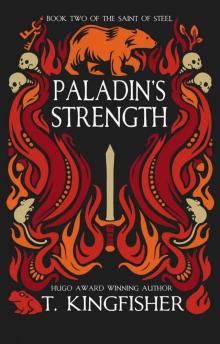 Paladin's Strength
Paladin's Strength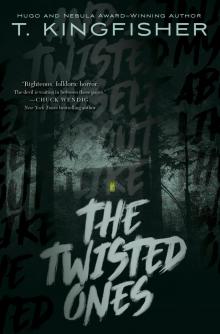 The Twisted Ones
The Twisted Ones The Hollow Places
The Hollow Places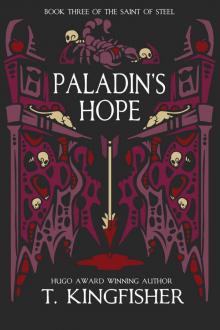 Paladin’s Hope: Book Three of the Saint of Steel
Paladin’s Hope: Book Three of the Saint of Steel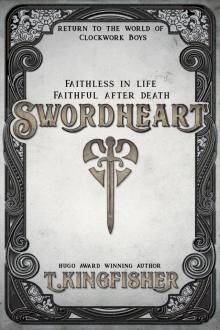 Swordheart
Swordheart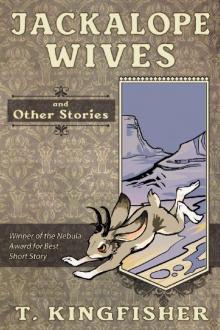 Jackalope Wives And Other Stories
Jackalope Wives And Other Stories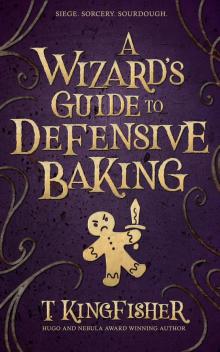 A Wizard's Guide to Defensive Baking
A Wizard's Guide to Defensive Baking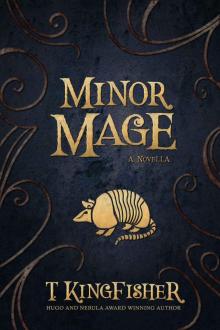 Minor Mage
Minor Mage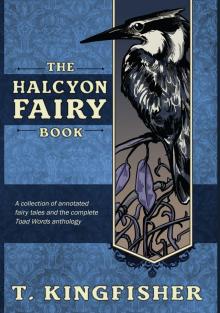 The Halcyon Fairy Book
The Halcyon Fairy Book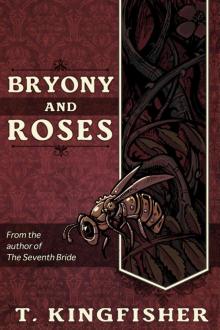 Bryony and Roses
Bryony and Roses The Wonder Engine_Book Two of the Clocktaur War
The Wonder Engine_Book Two of the Clocktaur War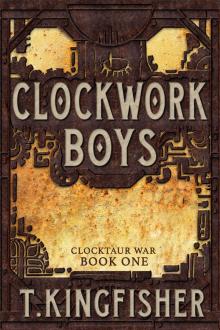 Clockwork Boys: Book One of the Clocktaur War
Clockwork Boys: Book One of the Clocktaur War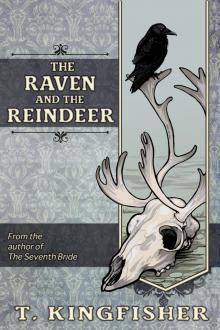 The Raven and the Reindeer
The Raven and the Reindeer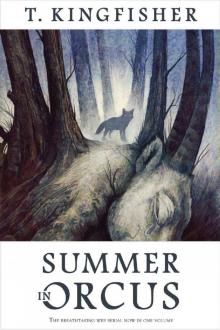 Summer in Orcus
Summer in Orcus The Wonder Engine
The Wonder Engine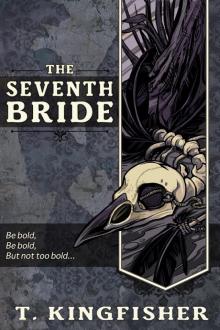 Seventh Bride
Seventh Bride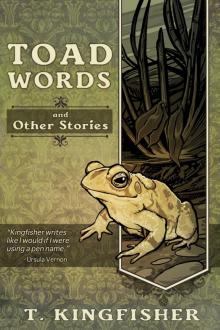 Toad Words
Toad Words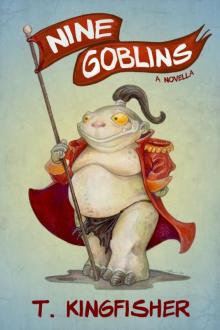 Nine Goblins
Nine Goblins